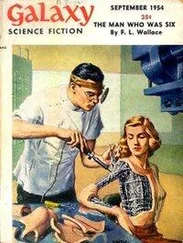“You shouldn’t kick them, Bat Ears.”
“Well, Ira, I didn’t really kick him. That was just a figure of speech, kind of. No sir, I didn’t kick him. I took a shovel to him. Always could handle a shovel some better than my feet. Reach farther and…”
He reached out and took the bottle, lowered it another inch or two.
“This crisis, Ira?”
“It’s the serum,” Warren told him. “Morgan waited until the ship had got too far for us to contact them before he thought to check the serum. And it isn’t any good—it’s about ten years too old.”
Bat Ears sat half stunned.
“So we don’t get our booster shots,” said Warren, “and that means that we will die. There’s this deadly virus here, the … the—oh, well, I can’t remember the name of it. But you know about it.”
“Sure,” said Bat Ears. “Sure I know about it.”
“Funny thing,” said Warren. “You’d expect to find something like that on one of the jungle planets. But, no, you find it here. Something about the natives. They’re humanoid. Got the same kind of guts we got. So the virus developed an ability to attack a humanoid system. We are good, new material for it.”
“It don’t seem to bother the natives none now,” said Bat Ears.
“No,” said Warren. “They seem to be immune. One of two things: They’ve found a cure or they’ve developed natural immunity.”
“If they’ve found a cure,” said Bat Ears, “we can shake it out of them.”
“And if they haven’t,” said Warren, “if adaptation is the answer—then we’re dead ducks for sure.”
“We’ll start working on them,” said Bat Ears. “They hate us and they’d love to see us croak, but we’ll find some way to get it out of them.”
“Everything always hates us,” Warren said. “Why is that, Bat Ears? We do our best and they always hate us. On every planet that Man has set a foot on. We try to make them like us, we do all we can for them. But they resent our help. Or reject our friendliness. Or take us for a bunch of suckers—so that finally we lose our patience and we take a shovel to them.”
“And then,” said Bat Ears, sanctimoniously, “the fat is in the fire.”
“What I’m worried about is the men,” said Warren. “When they hear about this serum business…”
“We can’t tell them,” said Bat Ears. “We can’t let them know. They’ll find out, after a while, of course, but not right away.”
“Morgan is the only one who knows,” said Warren, “and he blabs. We can’t keep him quiet. It’ll be all over camp by morning.”
Bat Ears rose ponderously. He towered over Warren as he reached out a hand for the bottle on the desk.
“I’ll drop in on Morgan on my way back,” he said. “I’ll fix it so he won’t talk.”
He took a long pull at the bottle and set it back.
“I’ll draw a picture of what’ll happen to him if he does,” said Bat Ears.
Warren sat easily in his chair, watching the retreating back of Bat Ears Brady. Always there in a pinch, he thought. Always a man that you can depend on.
Bat Ears was back in three minutes flat. He stood in the entrance of the tent, no sign of drunkenness upon him, his face solemn, eyes large with the thing he’d seen.
“He croaked himself,” he said.
That was the solemn truth.
Dr. James H. Morgan lay dead inside his tent, his throat sliced open with a professional nicety that no one but a surgeon could have managed.
About midnight the searching party brought in Falkner.
Warren stared wearily at him. The kid was scared. He was all scratched up from floundering around in the darkness and he was pale around the gills.
“He saw our light, sir,” said Peabody, “and let out a yell. That’s the way we found him.”
“Thank you, Peabody,” said Warren. “I’ll see you in the morning. I want to talk to Falkner.”
“Yes, sir,” said Peabody. “I am glad we found him, sir.”
Wish I had more like him, thought Warren. Bat Ears, the ancient planet-checker; Peabody, an old army man, and Gilmer, the grizzled supply officer. Those are the ones to count on. The rest of them are punks.
Falkner tried to stand stiff and straight.
“You see, sir,” he told Warren, “it was like this: I thought I saw an outcropping…”
Warren interrupted him. “You know, of course, Mr. Falkner, that it is an expedition rule you are never to go out by yourself; that under no circumstances is one to go off by himself.”
“Yes, sir,” said Falkner, “I know that…”
“You are aware,” said Warren, “that you are alive only by some incredible quirk of fate. You would have frozen before morning if the natives hadn’t got you first.”
“I saw a native, sir. He didn’t bother me.”
“You are more than lucky, then,” said Warren. “It isn’t often that a native hasn’t got the time to spare to slit a human’s throat. In the five expeditions that have been here before us, they have killed a full eighteen. Those stone knives they have, I can assure you, make very ragged slitting.”
Warren drew a record book in front of him, opened it and made a very careful notation.
“Mr. Falkner,” he said, “you will be confined to camp for a two-week period for infraction of the rules. Also, during that time, you shall be attached to Mr. Brady.”
“Mr. Brady, sir? The cook?”
“Precisely,” said Warren. “He probably shall want you to hustle fuel and help with the meals and dispose of garbage and other such light tasks.”
“But I was sent on this expedition to make geologic observations, not to help the cook.”
“All very true,” admitted Warren. “But, likewise, you were sent out under certain regulations. You have seen fit to disregard those regulations and I see fit, as a result, to discipline you. That is all, Mr. Falkner.”
Falkner turned stiffly and moved toward the tent flap.
“By the way,” said Warren, “I forgot to tell you. I’m glad that you got back.”
Falkner did not answer.
Warren stiffened for a moment, then relaxed. After all, he thought, what did it matter? Within another few weeks nothing would matter for him and Falkner, nor for any of the rest.
The chaplain showed up the first thing in the morning. Warren was sitting on the edge of his cot, pulling on his trousers, when the man came in. It was cold and Warren was shivering despite the sputtering of the little stove that stood beside the desk.
The chaplain was very precise and businesslike about his visit.
“I thought I should talk with you,” he said, “about arranging services for our dear departed friend.”
“What dear departed friend?” asked Warren, shivering and pulling on a shoe.
“Why, Dr. Morgan, of course.”
“I see,” said Warren. “Yes, I suppose we shall have to bury him.”
The chaplain stiffened just a little.
“I was wondering if the doctor had any religious convictions, any sort of preference.”
“I doubt it very much,” said Warren. “If I were you, I’d hold it down to minimum simplicity.”
“That’s what I thought,” said the chaplain. “A few words, perhaps, and a simple prayer.”
“Yes,” said Warren. “A prayer by all means. We’ll need a lot of prayer.”
“Pardon me, sir?”
“Oh,” Warren told him, “don’t mind me. Just wool-gathering, that’s all.”
“I see,” said the chaplain. “I was wondering, sir, if you have any idea what might have made him do it.”
“Who do what?”
“What made the doctor commit suicide.”
“Oh, that,” said Warren. “Just an unstable character, I guess.”
He laced his shoes and stood up.
“Mr. Barnes,” he said, “you are a man of God, and a very good one from what I’ve seen of you. You may have the answer to a question that is bothering me.”
Читать дальше












